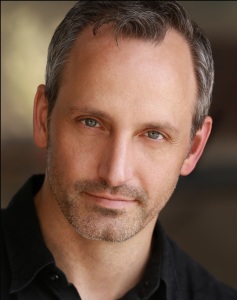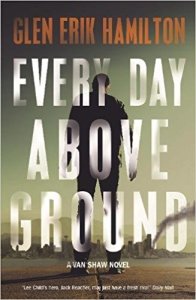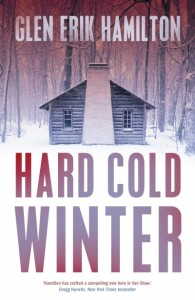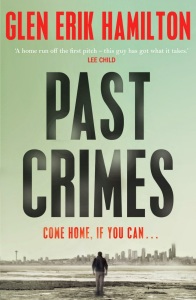Interview with Glen Erik Hamilton, author of ‘Hard Cold Winter’
 Thriller Books Journal is pleased to host Glen Erik Hamilton, author of ‘Hard Cold Winter’, another intense, fast-paced thriller featuring unconventional hero Van Shaw.
Thriller Books Journal is pleased to host Glen Erik Hamilton, author of ‘Hard Cold Winter’, another intense, fast-paced thriller featuring unconventional hero Van Shaw.
[Q]: Hello Glen, nice to meet you and thank you for joining us. Let’s start with some background: was writing fiction your first professional calling, and if not, how and when did you start writing?
[A]: Hello, and thank you! Writing fiction is relatively new for me. While I always enjoyed creative writing in school, I had (and still have) a fairly normal corporate day job, and most of my personal life was happily squandered in theatrical productions. About ten years ago, my family relocated from my hometown of Seattle to the Los Angeles area. I decided to take some time off before hunting for the next job, so I visited the library every day and sat in a carrel with pen and paper, putting sentences together to see if I enjoyed the grunt work. I did, and that led to classes, and here I am now, still struggling to put sentences together but getting paid for my trouble.
[Q]: ‘Hard Cold Winter’ is the second novel (after ‘Past Crimes’) featuring former US Army Ranger Van Shaw as the leading character. He isn’t a cop or a lawyer/public prosecutor, nor a private investigator or anyone connected with law-enforcement. In his youth he actually was also a thief… yet he hunts criminals, after his own fashion. Can you tell us something more about Van Shaw’s genesis as a crime/thriller fiction character?
[A]: I started with the desire to write about someone who was raised with a very different moral compass. The notion of Van being raised by his maternal grandfather, apprenticing as a professional thief, and then up-ending his views of right and wrong in adulthood offered a lot of dramatic possibilities.
The military part of Van’s back story came later. I wanted him to be gone – all the way gone – from his hometown for many years, and it was logical that a young strong kid with discipline and no resources might enter the military. That decision turned out to be a boon, fictionally speaking, because it let me give Van a new perspective that was at polar opposites from his childhood. He’s a man struggling to reconcile the two viewpoints, because while the law is frequently black-and-white, justice is usually gray.
[Q]: Combat experience in the Middle East has left both visible and invisible – but no less vicious – scars on Van Shaw. His own strength of character seems to allow him to deal with them, or at least live with them. As you hint with the Leo Pak character in ‘Hard Cold Winter’, a former Ranger who served under Van, this isn’t true of all combat veterans. How do you feel about this, and how serious an issue do you think this is in your country?
[A]: The hard part was making sure that I was treating these men with PTSD both realistically and respectfully, without sugarcoating the fact that their time at war may have changed them permanently. To have Van and Leo be recent veterans without acknowledging that would be inane. I did a lot of reading on the subject and had significant help from veterans I interviewed about their own experiences during and after combat deployments. While Van’s and Leo’s stories aren’t taken directly from those, they owe a debt, as do I.
As one of my friends, who was a Ranger in Afghanistan, put it: “Every guy I know has PTSD.” He meant it in the broader sense – that everyone who has gone through experiences that intense and violent has to deal with the repercussions later – but his statement gets to the core truth. Most veterans suffering from stress disorder aren’t a danger to anyone around them; they are a danger to themselves. The suicide rate is 22 veterans a day, according to a well-known 2013 study by the VA. Far above the national average for any other group. Far above the rate of soldiers killed in action. We pay the cost of war for a long, long time.
[Q]: Duty to one’s own family and friends is one of the values that permeate your narrative and lie at the heart of how its characters, Van Shaw above all, think and act. ‘Hard Cold Winter’ however focuses also on how such duty can, in some circumstances, be at odds with an individual’s ‘societal’ duties, and result sometimes in disastrous conflict. What are your views on this? Is there a fail-safe method to draw boundaries here?
[A]: Nope, and that’s why that situation is so rich to explore. Van could violate his own hard-won morality to help his family. He might break laws to protect his community, or to defend his country. There aren’t any hard-and-fast rules to keep Van from having to make tough and sometimes irrevocable choices. In the course of the series I want Van to grow, and be changed. Not always for the better.
[Q]: I particularly like how incisive your writing is, how you only need a few deft strokes to give the reader insight into a character, or plunge the reader into the thick of the action. As an author, how do you manage to focus on putting on paper only on what’s necessary, leaving out what may hinder a reader’s involvement in the story, without detracting from his/her appreciation of it?
[A]: Thank you, that’s very kind. In a thriller, as you know, pace is king. So far in my short career, I’ve tended to “write heavy” on the first draft, and then in rewrites I’ll excise what’s not needed to make sure we’re moving right along.
In general, there’s a greater impact the less you have. Rather than pausing to mention everything that a character is wearing and their facial features and so forth, I’ll liken them to a sparrowhawk or a concrete brick, for example, and that saves a lot of ink. It also allows the reader’s imagination to run free without tethering them to a ton of descriptives. If you want to include more specific details, you can have your protagonist notice those later in the chapter.
[Q]: ‘Hard Cold Winter’, like your first novel, is peppered with brave, strong female characters: from Van Shaw’s girlfriend Luce Boylan, to his neighbour Addy Proctor, to others who play key roles such as Elana Coll. Is this your way of saying that courage is gender-neutral, and that women have as much of a place as protagonists in crime and thriller fiction as men?
[A]: Women absolutely have that place, although you may be giving me too much credit to imply that I’m intentionally making any kind of statement. I do deliberately set up the other characters – male and female – to contrast Van’s beliefs. Luce’s strength of will surpasses even Van’s; she chose to stay on the straight-and-narrow at a very young age and she won’t be swayed from that. Addy, who I adore writing, has the perspective of age and experience and she’ll call Van out when he’s being pig-headed. It’s fun to take a character like Van, raised and trained in very male-dominated environments, and throw him in with women who are more than capable of holding their own.
TBJ: Thank you very much for your time Glen, and we look forward to reading another Van Shaw adventure soon!
[A]: Thank you; I’ve enjoyed it!
Hard Cold Winter by Glen Erik Hamilton is out now (Faber & Faber, £12.99)






